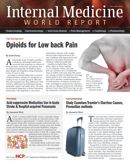Publication
Article
Internal Medicine World Report
Treatment Guidelines Updated for Irritable Bowel Syndrome
Author(s):
Assessing the quality of mounting pharmacological evidence, the American Gastroenterological Association (AGA) has updated guidelines on the treatment of irritable bowel syndrome (IBS).

Assessing the quality of mounting pharmacological evidence, the American Gastroenterological Association (AGA) has updated guidelines on the treatment of irritable bowel syndrome (IBS).
Experiencing cramps, bloating and constipation, IBS patients’ condition is often identified by hyperactivity and sensitivity of the colon, and an abnormal relationship between the brain and gut, according to the AGA’s website.
Affecting anywhere from 10% to 15% of the adult population, IBS is the most common gastroenterological diagnosis. Without a known cause, a panacea isn’t obtainable, as successful IBS treatment regimens differ from person to person, according to the AGA.
Their guidelines, which were published in Gastroenterology in November, offered revised treatment routes for patients with general IBS, IBS-C, and IBS-D, based off of a review of studies on popular IBS medications.
For IBS-C patients, the AGA recommended:
â— The use of linaclotide is adequate for the treatment of IBS, based off of high-quality evidence. They also noted IBS patients experiencing diarrhea would especially benefit from the medication.
â— Lubiprostone was also recommended for IBS treatment. However their suggestion was conditional, as it was made of moderate quality evidence.
â— Compared with no treatment, PEG laxative use was also encouraged. This deduction was based on a short follow-up period, a lack of data and methodological issues, making the quality of evidence low.
The AGA also highlighted the following drugs for IBS-D treatment:
â— From moderate evidence, the panel pressed for the use of rifaximin. Specifically, 2 random control trials (RCTs), provided limited evidence that the drug relieved abdominal pain and improved stool consistency.
â— Alosetron was found to also improve abdominal pain in multiple RCTs. Though, the Food and Drug Administration (FDA) dictated the medication only be prescribed to women, and due to the risk of idiopathic, non—dose-dependent ischemic colitis, the drug can only be administered in physician-based risk management programs.
â— Since several studies encountered methodological issues and sparse data, the researchers determined very-low quality evidence supported the use of loperamide.
Moreover, the AGA provided insight into popular for general IBS including:
â— While several studies looked at the use of low cost tricyclic antidepressants, the results that were yielded were low-quality.
â— Several studies, have disputed the effectiveness of selective serotonin reuptake inhibitors, but few did find a modest improvement in abdominal pain. However, the researchers claimed there are minimal adverse effects (AE) from the drug.
â— Because most studies looked at the continuous use of antispasmodics (versus an as needed basis), and experienced several biases, the investigators deemed the evidence supporting antispasmodics’ efficacy was low-quality.
Concluding their study, David S. Weinberg of the Fox Chase Center in Philadelphia and his colleagues claimed their guidelines were created using the Grading of Recommendations Assessment, Development and Evaluation (GRADE) methodology. However, the investigators did not look at the use of nonpharmacological treatments (e.g. sedation) for IBS. Moreover, they explained that a majority of their recommendations were weak as a result of “the quality of the available data and/or the balance of risks and benefits for a particular therapy do not overwhelmingly support its use.”






